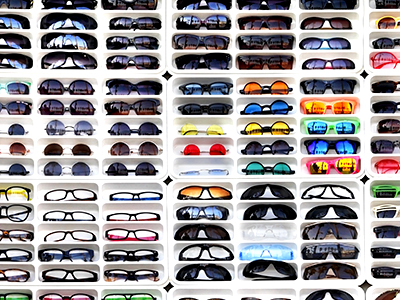
Vision scientist Dr. Joanne Matsubara answers questions about eye care in the summer.
Q: Ouch, I forgot to bring my sunglasses to the beach and now my eyes are red and itchy. Is it possible to sunburn your eyes?
A: Yes, just as you can get a sunburn on your skin, many hours in the sun can expose unprotected eyes to dangerous longwave ultraviolet (UV) A and shortwave UVB rays. This can lead to sunburned eyes—a condition called photokeratitis or ultraviolet keratitis. You could have this condition if you spent several hours in the sun and your eyes are red and watering, itchy, sensitive to light or dry and gritty. Sunburned eyes can feel very irritated and can cause headaches, blurred vision and glare or halos around lights.
Q: Does sun exposure accumulate over time? What can I do to protect my eyes?
A: According to the American Academy of Ophthalmology, repeated exposure to UV radiation and near-UV light can contribute to cataracts, macular degeneration and growths on the eye, including cancer. This is why it is important to protect your eyes from sunlight by wearing sunglasses with UVA and UVB-blocking filters.
Q: Are all sunglasses basically the same, or are some better than others?
A: For the best protection for your eyes, look for sunglasses with the label ‘100 per cent UVA and UVB protection’. Inexpensive sunglass lenses may not have enough protection to shield your eyes from the harmful effects of UV rays. Make sure to wear proper sunglasses even on overcast or cloudy days, as UV radiation penetrates clouds. Even when wearing UV-blocking contact lenses, it is still recommended to double up your eye protection with sunglasses.

Q: My eyes feel more sensitive around water. Is this because of the glare?
A: Yes, being near water could lead to additional risks, as light reflects off the surface of water. This reflected light can add to the damage caused by direct sunlight. Sunlight can also be reflected off sand, or any light-coloured surface, including snow.
Q: What else can I do to keep my eyes healthy during the summer?
A: Wearing a wide-brimmed hat can help shade your eyes, so it is a good idea to combine sunglasses with a hat. Sunglasses with large frames and those that wrap around your face will also reduce the amount of light that can sneak in through the sides of your sunglasses. Lastly, remember to include regular trips to your ophthalmologist as part of your ongoing eye health routine.



